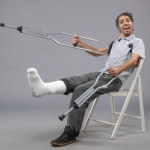Musculoskeletal injuries, ranging from sprains and strains to chronic conditions like tendonitis and back pain, are some of the most common reasons individuals seek medical care and/or physiotherapy treatment. Initially, they can be caused by a variety of factors, including trauma, overuse, poor posture, or aging. While conventional treatments such as physical therapy, medications, and surgery are often used to address these conditions, acupuncture has emerged as a complementary and alternative therapy. Fortunately, there is a growing body of evidence suggesting it may be effective in promoting healing, reducing pain, and improving function. Acupuncture, a cornerstone of Traditional Chinese Medicine (TCM), involves the insertion of thin needles into specific points on the body to stimulate energy flow. By targeting specific points, practitioners aim to restore balance and promote natural healing. How does acupuncture work for musculoskeletal injuries? Acupuncture can be used on many different body areas Pain management: One of…
Read More








